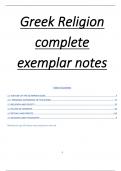Greek Religion
complete
exemplar notes
Table of Contents
1.1 NATURE OF THE OLYMPIAN GODS .......................................................................................................... 2
1.2. PERSONAL EXPERIENCE OF THE DIVINE ................................................................................................ 17
1.3 RELIGION AND SOCIETY ........................................................................................................................ 35
1.4 PLACES OF WORSHIP ............................................................................................................................ 64
1.5 RITUALS AND PRIESTS .........................................................................................................................116
1.6 RELIGION AND PHILOSOPHY ................................................................................................................... 0
Workbook to go with these notes attached at the end
1
, 1.1 NATURE OF THE OLYMPIAN GODS
ROLES AND ATTRIBUTES OF THE GODS
The Olympian Gods (12)
Zeus – order, justice, king of the gods, son of Kronos and Rhea
Hera – marriage, childbirth, wife and sister of Zeus and mother of Ares and Hephaestus
Poseidon – the sea and horses, brother of Zeus
Athena – wisdom and war strategy, crafts, heroes, D of Z
Artemis – hunting/archery, maidens, twin of Apollo, D of Z
Apollo – sun, music, prophecy, S of Z
Aphrodite – beauty and love, born from Ouranos’ semen
Demeter – harvest/agriculture, sister of Zeus
Hermes – messengers, travellers, merchants, and thieves, S of Z
Hephaestus – blacksmiths, S of Z and H
Ares – war, S of Z and H
Either Hestia – hearth, sister of Z so daughter of K and R
Or Dionysus – wine, theatre, S of Z (usually considered chthonic)
HOMER AND HESIOD
Major influence on Greek attitudes to the Olympians
Evidence = Herodotus:
‘Homer and Hesiod are the poets who composed theogonies and described the gods for the Greeks, giving
them their appropriate titles, offices and powers’
Homeric Hymns
2
,Not composed by Homer but attributed to him, and written in the same style and tradition as Homer’s epics
Explain the aetiology of gods’ cults
EVIDENCE:
‘protectress of cities...that fearsome goddess who cares with Ares for warlike works’
Significance – written in 700BC, and Panathenaic Amphora from 333BC shows how little has changed in her
worship, highlighting significance of Homeric texts
Homeric Hymns 28 – Birth of Athena
‘’quickly she leaped from his deathless head to stand/ Before Zeus who bears the aegis’
Also described in Theogony, on pediment at Parthenon
Many later images of Athena were likely attributed to these archaic poems
Gods in Hesiod
Works and Days – gives advice on how to live a morally good life
‘never pour gleaming wine to Zeus in the morning with unwashed hands’ as the gods will ‘spit out your prayers’
‘appease the immortal gods with libations and burnt offerings...so that they may have a gracious heart and
spirit towards you’
‘If a man is willing to say what he knows to be just, to him wide-seeing Zeus gives prosperity...for those who
occupy themselves with violence...wide-seeing Zeus, marks out retribution’ - sense of divine justice
‘there is no way to evade the purpose of Zeus’
Emphasizes power of Zeus and influence of his daughter Right
Gods in Homer
EVIDENCE:
3
, ‘no woman can reasonably compete with the gods in form or face’ - Calypso is vain but correct
‘Poseidon will relent. For he will not be able to struggle on alone against the united will of the immortal gods’ -
shows hierarchy and conflict between gods
‘she flattened the waves in the swimmer’s path so that Odysseus, favourite of Zeus, might be rescued from the
jaws of death’ - Athena shows favouritism
‘Athene has tricked me’ - Iliad 22, Athena has disguised herself as Deiphobus, misleading Hector into thinking
that his brother will support him in his fight against Achilles, but she isolates him and he dies
The gods are sometimes used as light relief – Book 1 of Iliad – Zeus and Hera quarrel but the tension is broken
by Hephaestus bustling around serving drinks causing laughter and hilarity among the gods
Divine immortality is contrasted against human mortality
‘the lord god’s immortal hair streamed forward from his deathless head’ Iliad
Key element is their immortality, emphasised in descriptions
(only one character dies on stage in the 32 surviving tragedies – Ajax in Sophocles’ Ajax, likely because
performances were in honour of Dionysus and he should not be tarnished by death)
‘ah how shameless – the way these mortals blame the gods...they, themselves, with their own reckless ways,
compound their pains beyond their proper share’ - Odyssey I
‘I am preeminent among the gods for ingenuity and the ability to get what I want’ - gods are not moral
examples, are selfish
‘I did not notice you then, daughter of Zeus, nor see you set foot on my ship to save me from any of my
ordeals’- Odysseus points out the inconsistencies of the gods, what is the extent of their power? Should you
place faith in them? (Athena’s power is often checked by other gods)
‘their own transgressions have brought them to this ignominious death’
SCHOLARSHIP ABOUT GODS IN HOMER
‘a chief source of comedy’ - James Redfield
‘all sorts of not very heroic qualities are allowed to enter the lives of the gods’ - Geoffrey Kirk
Full of ‘really impressive gods’ who deserve worship – Jasper Griffin
The gods are not portrayed as amoral but instead offer divine justice – William Allan
Explain why H+H were important to the Greeks [10]
4




